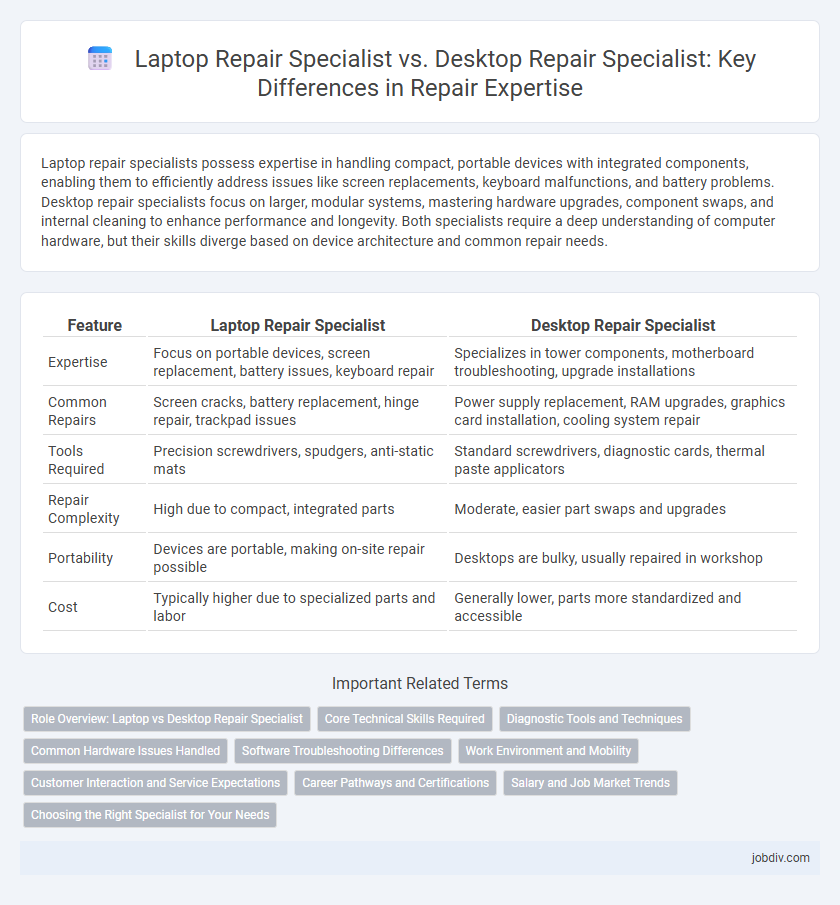Laptop repair specialists possess expertise in handling compact, portable devices with integrated components, enabling them to efficiently address issues like screen replacements, keyboard malfunctions, and battery problems. Desktop repair specialists focus on larger, modular systems, mastering hardware upgrades, component swaps, and internal cleaning to enhance performance and longevity. Both specialists require a deep understanding of computer hardware, but their skills diverge based on device architecture and common repair needs.
Table of Comparison
| Feature | Laptop Repair Specialist | Desktop Repair Specialist |
|---|---|---|
| Expertise | Focus on portable devices, screen replacement, battery issues, keyboard repair | Specializes in tower components, motherboard troubleshooting, upgrade installations |
| Common Repairs | Screen cracks, battery replacement, hinge repair, trackpad issues | Power supply replacement, RAM upgrades, graphics card installation, cooling system repair |
| Tools Required | Precision screwdrivers, spudgers, anti-static mats | Standard screwdrivers, diagnostic cards, thermal paste applicators |
| Repair Complexity | High due to compact, integrated parts | Moderate, easier part swaps and upgrades |
| Portability | Devices are portable, making on-site repair possible | Desktops are bulky, usually repaired in workshop |
| Cost | Typically higher due to specialized parts and labor | Generally lower, parts more standardized and accessible |
Role Overview: Laptop vs Desktop Repair Specialist
Laptop repair specialists focus on diagnosing and fixing hardware and software issues in portable devices, typically handling components like batteries, screens, and keyboards unique to laptops. Desktop repair specialists specialize in maintaining and repairing stationary computers, dealing with components such as motherboards, power supplies, and towers designed for desktop configurations. Both roles require expertise in troubleshooting, component replacement, and system optimization tailored to the differing architectures and use cases of laptops versus desktops.
Core Technical Skills Required
Laptop repair specialists require expertise in working with compact hardware components, intricate soldering, and diagnosing issues related to battery performance and display assemblies. Desktop repair specialists focus on skills involving the assembly and troubleshooting of modular components like motherboards, power supplies, and cooling systems. Both roles demand proficiency in operating system diagnostics, hardware-software integration, and data recovery techniques.
Diagnostic Tools and Techniques
Laptop repair specialists employ advanced diagnostic tools such as thermal imaging cameras and BGA rework stations to address compact, integrated components and soldered parts unique to laptops. Desktop repair specialists utilize software-based diagnostics and hardware testers tailored for modular and easily accessible desktop components, enabling efficient fault isolation and component replacement. Both specialists rely on multimeters and POST (Power-On Self-Test) cards, but laptop repair demands precision techniques due to space constraints and heat-sensitive elements.
Common Hardware Issues Handled
Laptop repair specialists commonly address issues such as broken screens, faulty keyboards, battery replacements, and overheating problems due to compact internal design. Desktop repair specialists focus on hardware repairs including power supply failures, motherboard malfunctions, RAM replacements, and graphics card troubleshooting given the modular nature of desktops. Both specialists are skilled in diagnosing hardware problems but adapt their techniques based on device form factors and component accessibility.
Software Troubleshooting Differences
Laptop repair specialists focus on software troubleshooting that addresses hardware-software integration unique to portable devices, such as power management issues, driver conflicts with integrated components, and optimization of battery-related software settings. Desktop repair specialists typically handle software problems related to a wider range of hardware configurations, including compatibility issues with external peripherals, BIOS firmware updates, and operating system conflicts affecting high-performance components. Both roles require proficiency in diagnosing operating system errors, malware removal, and system restoration, but laptop specialists emphasize mobility-related software solutions.
Work Environment and Mobility
Laptop repair specialists often work in dynamic environments requiring high mobility to troubleshoot and fix devices on-site or in various locations, leveraging portable tools and diagnostic equipment. Desktop repair specialists typically operate within fixed workstations, allowing access to larger repair setups and components, but with limited on-the-go flexibility. The distinct work environments shape specialized skill sets and toolkits tailored to the differing mobility demands and hardware configurations of laptops versus desktops.
Customer Interaction and Service Expectations
Laptop repair specialists often engage in more detailed customer interactions due to the portable nature and personalized data concerns of laptops, requiring clear communication about data backup and delicate hardware handling. Desktop repair specialists typically manage larger, less mobile systems, focusing on hardware diagnostics and upgrades, with customer service emphasizing system customization and performance optimization. Both roles demand expertise, but laptop repair services generally expect faster turnaround times and more sensitivity to data privacy from customer interactions.
Career Pathways and Certifications
Laptop repair specialists often pursue certifications like CompTIA A+ and manufacturer-specific credentials such as the Apple Certified Mac Technician (ACMT), emphasizing skills in compact hardware and portable device diagnostics. Desktop repair specialists typically gain expertise through certifications like Microsoft Certified: Modern Desktop Administrator Associate, focusing on assembling, upgrading, and troubleshooting customizable desktop components. Career pathways for laptop repair professionals lead toward mobile IT support and hardware engineering roles, while desktop repair experts often transition into network administration and system integration positions.
Salary and Job Market Trends
Laptop repair specialists generally command higher salaries than desktop repair specialists due to the increasing demand for portable device maintenance and the complexity of laptop hardware. The job market for laptop repair technicians is expanding rapidly, driven by the widespread use of mobile computing devices across various industries. Desktop repair specialists face a slower growth rate in job opportunities, as many companies transition to laptop and mobile solutions, reducing the need for traditional desktop maintenance.
Choosing the Right Specialist for Your Needs
When deciding between a laptop repair specialist and a desktop repair specialist, consider the specific hardware and software expertise required for your device. Laptop repair specialists excel in compact, integrated components, including screen, keyboard, and battery issues, while desktop repair specialists focus on modular parts and custom configurations. Selecting the right specialist ensures efficient diagnosis, optimal repair solutions, and prolonged device lifespan.
Laptop Repair Specialist vs Desktop Repair Specialist Infographic

 jobdiv.com
jobdiv.com